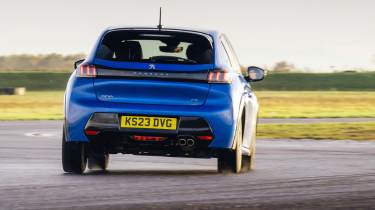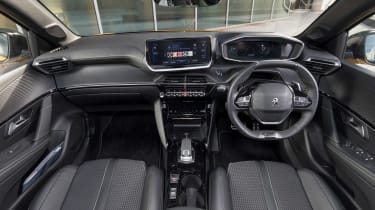Peugeot 208 2025 review – a fine alternative to the Ford Fiesta
Today's Peugeot supermini is a very different beast to those that came before; it’s clever, stylish and hides a sweet chassis that’s clawing to get out
The modern supermini is a very different car to the ones that existed 20 years ago. The Peugeot 206, for instance, had a steering column that would rub between your feet as they sat on the pedals, which were hilariously off-set to one side – polish was certainly off the agenda. But step into the 208, some three generations the 206’s senior, and things are very different.
The 208 is built on a fresh platform built by PSA that is also found under the Corsa, and one destined to spread right across the wide reaches of its own brands, and those within its new FCA partnership. It’s bigger, more refined, more technologically advanced, and available with a fully electric powertrain, but it’s the petrol model that is still likely to find more homes in the UK.
> Peugeot 9X8: a deep dive into the wingless Le Mans Hypercar
We’ve got to grips with the range-topping petrol 208 GT, powered by a 1.2-litre turbocharged three-cylinder engine with 98bhp. By all accounts, it's not particularly special on paper, but it fights back as an energetic unit that pulls surprisingly hard for something with so little on-paper shove. For that, we can thank the turbo’s willingness to spin up promptly due to its compactness, making for a powertrain that feels far more punchy than its 96bhp and 151lb ft of torque would suggest.
More reviews
Group tests
Reviews
When paired with the eight-speed torque-converter automatic transmission fitted here, its 0-62mph time is a class competitive 10.8sec, 0.9sec slower than when fitted with the standard six-speed manual. The torque-converter’s slight power sappage isn’t quite offset by the manual’s longer gearing, and despite the longer final drive is also a few MPG less efficient. The 208’s top speed is 117mph.
Accept its modest grip limits and the 208 noses around with small flicks of the tiny steering wheel, and probably feels the second most ‘on its tiptoes’ here, after the even lighter Swift. ‘The steering is quite fast and flighty, which gives it an imbued sense of sportiness,’ says James, though he notes ‘it’s more of a placebo effect.’ I find its agility quite enjoyable on the road, which is also where the 129bhp powertrain works best, with punchy responses at low to medium revs and relatively quick changes from this car’s six-speed automatic (and cheap-feeling paddleshifters), with a ride that strikes a good balance between fluidity and body control.
It’s predictably less strong on track, where you quickly discover that the engine basically gives up somewhere after the mid-range. I’d love to tell you how much of the engine’s bandwidth is actually useable, but as with the 308 there’s no tachometer in the fancy floating digital instruments.
The gearshift also gives up any hint of snappiness at maximum revs, with drawn-out, slurred changes like a 30-year-old slushbox. The manual alternative would be better in theory, though past experience suggests the 1.2-litre turbo engine also suffers from yawning rev hang, so fast shifts just aren’t in its repertoire. Don’t get your hopes up for Sport mode either: it’s about as effective as putting a racing stripe on a patisserie.
The 205-section Michelin Primacy 4 tyres also feel somewhat overworked on track, though the chassis is still the 208’s strongest suit. It steers sweetly, not unlike those old 208 GTis with their similarly button-like steering wheels, and there’s good balance hiding behind disappointingly aggressive and very much permanent stability and traction control systems. You can turn them off, but they switch right back on at 30mph, as per the 308 GT.
From a technical perspective, PSA’s new CMP modular platform that this new 208 is built on doesn’t have any real technical highlights, but the fact this new 208 is both bigger, more refined and loaded with kit, yet lighter than its dainty predecessor is highlight enough. Weighing in at just 1090kg for our GT automatic, it’s an impressive feat considering how refined and substantial the 208 feels.
The interior also proves to be a big step forward in the supermini conversation, with a complex and ornate interior that’s interesting, well constructed, and even a little glamorous. A highlight is the 3D-effect i-Cockpit set-up, which takes Peugeot’s controversial small steering wheel, high-mounted dials combination one step further by squaring off the steering wheel into a sort of octagonal shape, while the now completely digital dial set is three-dimensional, thanks to some trick reflection-based projection similar to what you’ll find on a head-up display.
Lots of big-car tech has made its way into the 208, with a panoramic sunroof, massaging leather seats, adaptive LED headlights, active cruise control and a 10.1-inch high-set infotainment system all able to be specified.
At cruising speeds, town speeds, and on the motorway, the 208 is a very accomplished supermini though. Refinement is impressive (although the three-cylinder does struggle to contain vibrations at idle oddly), and all the controls feel more finely calibrated than in many a supermini rival.
It gets the basics right then, but just needs finishing off. ‘They should do a hot hatch version,’ says John, ‘with a rev counter and another 50bhp.’ Pity it’ll never happen.
Prices, specs and rivals
Prices for the 208 now start at a rather hefty £23,710, with our GT 100PS auto coming in at £27,660. The range-topping e-208 is priced at £32,900 in the same GT specification, making it model-for-model a £5240 premium on our 98bhp 1-litre.
To balance the GT’s high price point, it’s loaded with standard features such as 17-inch alloys, ambient lighting, automated parking assistance, climate control, satnav, those funky LED lights, front and rear sensors, and a rear camera.
Rivals in the supermini class are extensive, the equally fresh Renault Clio being its most obvious rival. The entry-level E-Tech hybrid now costs from £18,395, and while direct rivals, the Volkswagen Polo, Vauxhall Corsa, Skoda Fabia, SEAT Ibiza and its kind are all extremely dull, if competent and competitively priced. The Ford Fiesta was an excellent, dynamic offering, but has now been axed.
Despite its mainstream origins the 208, more than most in the class, has found a way of making a supermini feel, well, super. With the Ford Fiesta no longer an option, the 208 is a worthy contender for the top spot in the class.
Peugeot 208 GT specs
| Engine | In-line 3-cyl, 1199cc, turbocharged |
| Power | 129bhp @ 5500rpm |
| Torque | 170lb ft @ 1750rpm |
| Weight | 1158kg (1180kg as tested) |
| Power-to-weight | 113bhp/ton |
| 0-62mph | 8.7sec |
| Top speed | 129mph |






